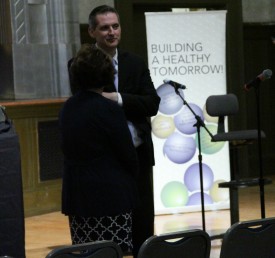
L-R: Panelists Arturo Brito, NJ Dept. of Health; Ruth Perry, Trenton Health Team; Abena Busia, moderator and Debra Palmer, NJ SNAP-Ed.
On April 29, against the backdrop of the historic Trenton War Memorial, over 75 of Trenton’s local community members and health professionals gathered in impassioned discussion for the final event in the grant series, Food and the Human Experience, facilitated by the New Jersey Institute of Food, Nutrition and Health (IFNH). For the past year, IFNH has partnered with the Rutgers Center for Digital Filmmaking on a grant from the New Jersey Council for the Humanities to bring the discussion of food justice in New Jersey to cities across the state. This three-part community forum and film screening series endeavors to illuminate our understanding of the complexities of food access and childhood obesity through the framework of the Humanities.
At the Trenton event, Abena Busia, associate professor of English and chair of the Department of Women’s and Gender Studies at Rutgers, served as panel leader and orchestrated the diverse perspectives represented by the panel, in an examination of our human relationship to food. Joining Busia on the panel were the Deputy Commissioner of the New Jersey Department of Health Arturo Brito, the Executive Director of the Trenton Health Team Ruth Perry and Rutgers professor and Director of the New Jersey Supplement Nutrition Assistance Program (SNAP-Ed) Debra Palmer. The Executive Director of the New Jersey Council for the Humanities Briann Greenfield presented welcoming remarks.

NJ Dept. of Health’s Arturo Brito interacts with an attendee.
Families, many on food stamps themselves, as well as community organizers from local NGOs and food banks, and leaders of health and educational initiatives in the city gathered to discuss the efficacy of programs designed to combat hunger and obesity in the area. Children colored in health pamphlets brought by a local immigrants’ rights organization while their parents discussed the health struggles of their families, face to face with government officials and heads of hospitals.
Food justice is inextricably linked to a wider idea of social justice, the complexities of race and culture and the ethical concerns of community responsibility. In the room that evening was a vibrant sense of a community coming together to talk about what makes us human and how we can work together to create change.
To watch videos from the Trenton event, as well as the documentary screened in the series, Generation at Risk, visit http://foodandhumanexperience.org.

